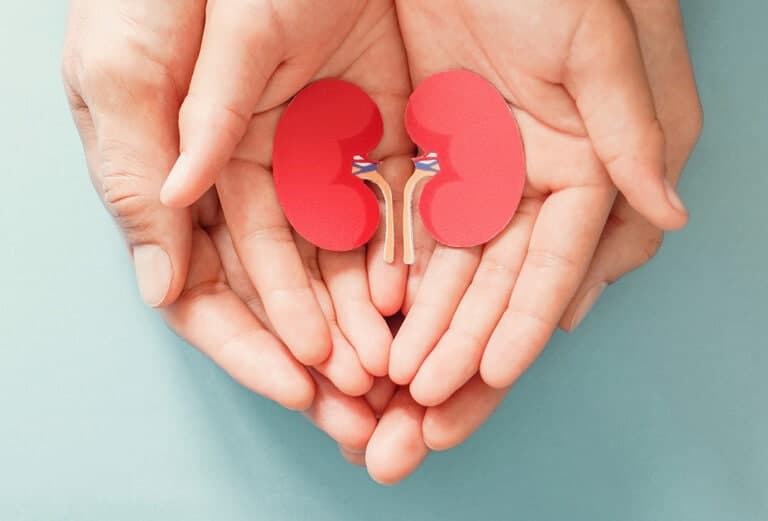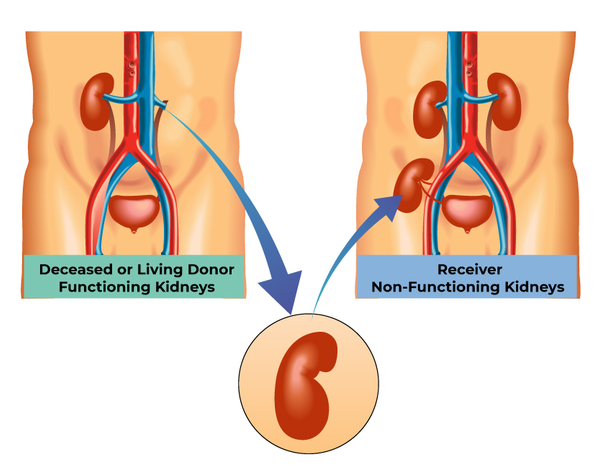What is Kidney Transplant Surgery?
Kidney Transplant or Renal transplant Surgery is a medical procedure that involves implanting a healthy Kidney from a living or deceased donor into a patient with severely impaired Kidney function. This procedure is often recommended for individuals with end-stage kidney disease (ESKD) or chronic Kidney failure, as it provides a better quality of life compared to long-term dialysis.
General introduction to the Kidneys
The Kidneys are two vital organs located beneath the ribcage that play a key role in filtering waste, excess fluids, and toxins from the blood. They also regulate blood pressure, balance electrolytes, stimulate red blood cell production, and support bone health.
Each Kidney contains about one million nephrons, which help maintain a stable internal environment. Despite their small size, they filter nearly 50 gallons of blood daily. If Kidney function declines due to disease or injury, treatments like dialysis or transplantation may be needed. Maintaining a healthy diet, staying hydrated, and regular check-ups are essential for kidney health.
History of Kidney Transplant Surgery
In 1954, a medical team successfully performed the Kidney transplant, with Joseph Murray as the recipient’s surgeon and Hartwell Harrison as the donor’s surgeon. Murray’s groundbreaking work in transplantation earned him the Nobel Prize in Physiology or Medicine in 1990. By 2018, around 95,479 kidney transplants were conducted worldwide, with 36% involving living donors.
Kidney Transplant in Iran
Utilizing medical tourism services in other countries, particularly in Iran, enables you to access high-quality care in advanced, well-equipped medical centers while significantly reducing treatment costs.
Iran is among the top countries in Kidney transplantation, with a well-organized and regulated system. Its unique legal framework permits living unrelated donors to donate Kidneys under government supervision, significantly reducing patient wait times. Iranian medical center conducts numerous successful kidneys transplants each year, utilizing advanced surgical techniques and comprehensive post-transplant care. The combination of expert surgeons, cost-effective healthcare, and ethical organ donation policies position Iran as a leading destination for kidney transplant procedures in the region.
Kidney Transplant procedure steps
As mentioned earlier, a Renal or Kidney transplant is a crucial treatment for end-stage kidney disease. Improving quality of life and reducing dependence on dialysis. The procedure steps include:
- Medical Evaluation
The recipient undergoes comprehensive medical tests, including blood tests, imaging, and tissue matching, to assess compatibility with the donor and overall health.
- Donor Kidney Retrieval
If the donor is living, the kidney is removed through minimally invasive or open surgery. In the case of a deceased donor, the kidney is carefully preserved and transported for transplantation.
- Surgery Preparation
The recipient is replaced under general anesthesia, and the surgical team sterilizes the area where the new kidney will be implanted.
- Transplants Surgery
A surgical incision is made in the lower abdomen, where the donor kidney is carefully positioned. Surgeons then attach the kidney to the recipient’s blood vessels and bladder to ensure proper function. In most cases, the damaged kidneys remain in place unless they present a health risk.
- Post-Surgery Care
Following the surgery, the patient remain under close medical supervision in the hospital for a few days. To prevent organ rejection, immunosuppressive medications are administered, and routine check-ups are necessary to monitor the kidney’s function and overall recovery.
Main Types of Renal Transplants
- Living Donor Renal Transplant
A kidney is donated by a healthy living person, usually a family member or friend. This type generally has higher success rates and shorter waiting times.
- Deceased Donor Renal Transplant
The kidney is taken from a recently deceased donor. Patients must wait on a transplant list until a compatible organ becomes available.
- Paired Renal Exchange
If a donor and recipient are incompatible, they can swap kidneys with another pair in a similar situation to receive a compatible match.
Each type offers its own advantages, and the most suitable choice depends on medical compatibility and donor availability.
The transplanted kidney is usually placed on the lower right or left side of the abdomen and starts working once properly connected.
Why Is a Kidney Transplants Needed?
Kidneys play a crucial role in filtering waste and excess fluids from the blood. When they stop working properly, toxins build up in the body, causing sever health issues. A kidney transplant is a vital procedure that restored kidney function, preventing complications significantly improving overall well-being.
Eligibility for kidney Transplants
Not all patients with kidney failure are eligible for transplant. Medical evaluations are conducted to determine whether a patient is a good candidate.
Factors such as age, overall health, underlying medical conditions, and the presence of infections or cancers are considered before approval for the surgery.
To have a kidney transplant, you must:
- Have chronic kidney disease or end- stage renal failure.
- Be in good overall health to undergo major surgery.
- Have a high likelihood of a successful transplant.
- Commit to taking necessary post-transplant medications, including immunosuppressants, as prescribed.
How Renal Transplants Surgery works
The procedure takes about 3-4 hours, during which the donated kidney is placed in the lower abdomen for optimal connection to blood vessels and the bladder. In most cases, the original kidneys remain unless removal is necessary.
After surgery, you may feel sore, but early movement is encouraging. Most patients go home within a few days. Frequent follow-ups at the transplant center are required initially, but appointments decrease over time if recovery goes well. Lifelong medication is essential to maintain kidney function and prevent rejection.
Disadvantages and Complications
While a kidney transplant can be a life-saving procedure, it carries certain risks, including:
- Organ rejection
The immune system may attack the new kidney.
- Infections
Immunosuppressive medications weaken the immune system, increasing infection risk.
- Blood clots or excessive bleeding
These complications can occur after surgery.
- Medication side effects
Some drugs may lead to high blood pressure, diabetes, or other health issues.
Advantages of Kidney Transplantation
- Removes the need for dialysis
No longer dependent in regular dialysis treatments.
- Enhance quality of life
Increase energy levels and overall well-being.
- Extends life expectancy
Offers a longer lifespan compared to dialysis patients.
- Provides more dietary and lifestyle freedom
Fewer restrictions on food and daily activities.
To contact Dr. Noorbala, Call +98 902 354 5100
For further details from Dr. Noorbala, please refer to the relevant page.
Conclusion
A kidney or Renal transplant is a life-changing solution for individuals with end-stage kidney failure. Although it comes with some risks, the advantages—such as improved health, greater independence, and freedom from dialysis—make it a preferred option. With the right medical care and adherence to treatment, transplants recipients can experience a significantly enhanced quality of life.
Frequently asked questions
- How long does a kidney transplants surgery take?
The procedure typically lasts between 3 to 5 hours, depending on the complexity of the surgery and the patient’s condition.
- What happens if the transplants kidney fails?
If the kidney fails, the patient may need to return to dialysis or undergo another transplant if eligible.
- Can you live a normal life after a kidney transplant?
Yes, many people lead healthy lives after a transplant. The one-year survival rate is about 95%, and the there -to five -year rate is around 90%. However, outcomes vary, so consult your doctor for personalized information.
- How much is maximum life after kidney transplant?
On average, a kidney from a living donor function for 15 to 20 years, while one from a deceased donor lasts around 8 to 12 years. Some transplants may last longer, while others may not. Although many patients receive a transplant after spending time on dialysis, it is not the only possible approach.



